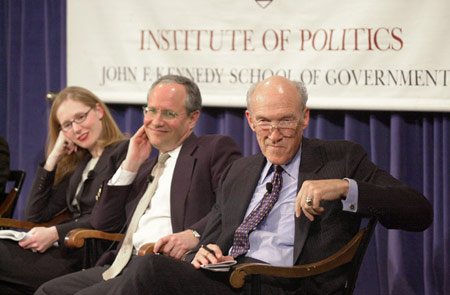GOP discusses how to stay on top
Top dog and underdog look to future

In his opening remarks at the Institute of Politics-sponsored panel discussion on the future of the Republican Party, Harvard College Republican Club President Brian Grech recounted a comment made by a former IOP fellow: “You know, Brian,” he said, “I used to think I knew what it was like to be a minority, because I’m Latino. But I didn’t really know what a minority was until I was a Republican at Harvard.”
Perhaps, but you couldn’t tell from the size of the crowd that packed the ARCO Forum Monday night (March 11) to hear moderator David Gergen and panelists Steven Goldsmith, faculty director for the Innovations in American Government program at the Kennedy School and special adviser to President Bush on faith-based initiatives; William Kristol, a political analyst and editor of The Weekly Standard; former senator Alan Simpson, who served as the IOP’s director for two years; and Juleanna Glover Weiss, a fellow at the IOP and former press secretary to Vice President Dick Cheney.
The group was generally upbeat – as Republicans have every right to be, with their president enjoying unprecedented approval ratings – but did sound a few notes of caution. One of the main themes of the evening was the transformative power of war.
Gergen, a commentator and former adviser to four presidential administrations, recalled both the long Republican runs that followed the Civil War and World War II, and President George H.W. Bush’s huge drop in the polls 18 months after the end of the Gulf War, asking which way the fallout from the war in Afghanistan was likely to go. Though panelists agreed that Bush fils’ good handling of the current war presents the opportunity to move on to important accomplishments on the domestic front, they also pointed out that it was simply too early to tell exactly how this war will alter the political landscape: “Is Bush a successful war president or an unsuccessful war president?” asked Kristol. “A huge amount depends on that.”
He was referring, of course, to the president’s moves in entering the next phase of the war on terrorism. There was little doubt among the panelists that one of Bush’s primary goals is the removal of Iraqi leader Saddam Hussein, despite the fact that, according to Kristol, “there’s a strain of the Republican Party that’s not happy” about the expansion of the war. He predicted that “down the road we could easily have a realignment on foreign-policy grounds,” pointing out that Bush, more actively engaged in nation-building than he was at the start of his term, now has more in common with Sen. Joe Lieberman, D-Conn., than with some Republicans on the idea of America acting aggressively, both militarily and diplomatically, to reshape the world. “I think that by October of 2004 people will have a sense of whether the president and the U.S. have made the world basically safer or not. It’s hard to know ahead of time what exactly that means but I think Iraq will be the key test, and that we’ll meet that test this year.”
The effort must be bipartisan, said Simpson, who believes that Lieberman would help the president to draft the resolution to Congress, but it need not require the agreement of UN Security Council. Perhaps most important, said Goldsmith, is that the president remain accountable to the American public. “I think he has to continue to make his case,” said Goldsmith, “he has to
make it in a very clear way, and he has to make the reasons that he reached those conclusions known to the United States.” It won’t do, Kristol added, “for Republicans in Congress to suppress dissent,” as they appeared to do in the recent dust-up in which House Majority Whip Tom DeLay called Senate Majority Leader Tom Daschle’s gentle questioning of war policy “disgusting.”
But what would action against Iraq mean to our relations with our allies in Europe and the Arab world? Kristol believes that simply keeping European allies better-informed will save the administration some headaches, but called the Arab world “tougher.” The key, he said, is winning over the people of those countries. “American principles will spill over,” he said, “if the president can do a better job of making the positive case, so to speak, or the upside of this American exertion of power in the world.”
Still, the ultimate measure of success, according to Glover Weiss, will be “whether there are more terrorist attacks” amid the administration’s commitment to protecting the American public.
Other themes touched on during the evening included the 2004 Republican ticket, with Glover Weiss and Simpson strongly asserting that Cheney would run again and Kristol predicting he would not; the public’s being slow to accept the concept of “compassionate conservatism”; the country’s changing demographics and how the much larger proportion of Hispanic voters will affect the GOP; women in the Republican party; the religious right; the collapse of Enron; and, of course, abortion.
“We give each other the saliva test of purity continually,” said Simpson, in the characteristically humorous way that endeared him to both students and faculty during his years at Harvard, “and then we lose, and then we bitch for four years. We will continue to get hurt so badly on that issue, and all they have to do is say that abortion is a deeply intimate and personal issue, and out of respect for each other should not be a political platform. You can’t talk about the ideals of the Republican party, independence, freedom of this and freedom of that, get the government out of my life and have that thing, that huge thing hanging there like the pit and the pendulum.”




